Food and Nutrition Security: one of the EU’s Top Priorities
Food security, jointly with the improvement of farming activity are among the major development priorities at EU level.

Corina Cristea, 13.05.2016, 14:28
Food
security, jointly with the improvement of farming activity through cutting-edge
methods are among the major development priorities at EU level. The eventual
aim is to secure consumer protection, while also providing a guarantee for the
proper functioning of the single market. Standards have been agreed upon, enabling the hygiene
of foodstuffs, plants and animals’ health, but also staving off contamination
with such substances as pesticides. In-depth check-up operations are conducted,
and imports from outside the European Union have to meet the same standards as
the community foodstuffs. Limits have been set up for additives and the
veterinarian and phyto-sanitary drugs that can be added to fodder, but also a rigorous system for licensing and
selling genetically modified organisms. Roxana Morea is a press adviser of the
European Commission’s Representation in Bucharest. She will now be explaining
what European policy stipulates as regards food security.
Food and nutrition security
guarantees that everybody has access to food that is nourishing,
cost-effective and available in acceptable quantities. Through the support provided in the field,
the European Union actually seeks to build and strengthen its capacity to adapt
and respond to food-related crises, providing the needed support for all
countries, so much so that no one should face starvation. Fighting malnutrition
is particularly vital, for children from disadvantaged categories to have the
chance to live a healthy life, to have access to education and therefore better
chances for building a good future. At the moment, every day, one person in
eight dies of starvation, mostly in sub-Saharan Africa and South Asia. As for
the European policy framework, it stipulates that nutrition security and sustainable agriculture are key
priorities for the European Union, especially with regard to development
cooperation policies.
Until 2030,
Brussels has set up its own food-related objectives, which include a greater
food production, which should be cost-effective and of higher quality, as well
as a sustainable and inclusive growth, given the present climate change conditions,
the scarcity of natural resources and the growth of the world population. With details on that, here is Roxana Morea
once again.
Access to food is a challenge in itself. It is not only access that
matters, but also the fact that the available foodstuff must be nourishing. The
European Union policy stipulates support mainly for the developing countries,
so that those countries, thanks to the support granted by the European Union,
can cover the four pillars, officially recognized at the 1996 global food
summit: availability of food resources, improved access
to those resources, the improvement of foodstuffs’ nutritional value, as well
as an enhanced crisis response and management capacity. To that effect, food
security is a policy sector set at EU
level, whereby the EU expresses its full commitment to ensuring the coherence
of the entire development cooperation policy. In order to provide an increased
adaptability to crises, prevention and preparation projects are important. Such
projects target the management of cyclic risks, such as hurricanes or strong
storms, or unpredictable vulnerabilities, such as earthquakes.
An important chapter in the European policy on
food security pertains to the prevention
of diseases transmitted from animals to humans. EU regulations guarantee that
zoonoses, such as salmonellosis or tuberculosis, are contained and only healthy
animals and foodstuffs obtained from healthy animals are allowed access to the
food supply chain. An equally important aspect is reducing the use of
antibiotics in farms. Antibiotics used to make up for the disproportionate
growth of animals and poultry resulted in an increased bacteria resistance to
treatments for humans.
Given that nearly
half of the antibiotics produced at world-level are used in farms, a series of
measures is a must, MEPs have recently ruled. They have voted a bill aimed to
update the European Union legislation on veterinarian medicines, targeting the
restricted use of the existing antimicrobial drugs and the creation of new
ones. And that, taking into account that the warnings issued by the World
Health Organization say we run the risk of getting closer to a post-antibiotics
era, where each year antimicrobial resistance causes a greater number of deaths
than cancer.
The president of Romania’s Veterinarians Association Viorel
Andronie shares his opinion on that:
Such a specification is a
warning signal and all decision-making bodies involved in that field should
unite, and everyone of them should do whatever needs to be done so as to
maximize the reduction of resistance to antibiotics. And most importantly, we should give people
the chance to benefit from antibiotics when they need that.
As early as
2006, Romania banned the use of antibiotics as growth promoters.






























